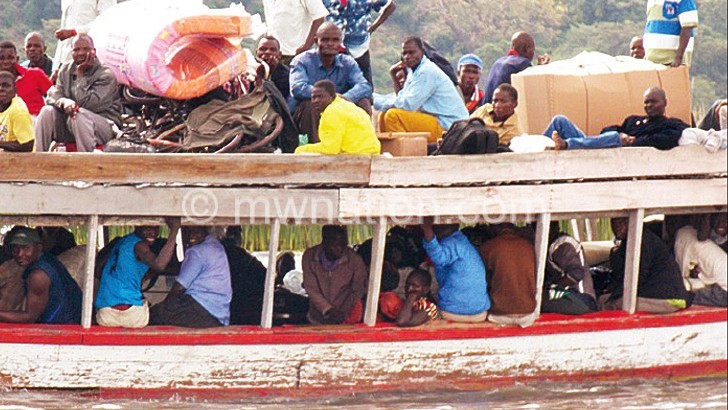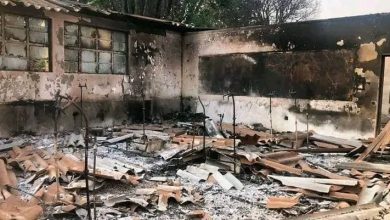Long sail to examinations
From the grey sandy soils of Nsombi, Lungazi and Ngotangota villages along the eastern shores of Lake Chilwa, school children sail across the lake just to sit for their Primary School Leaving Certificate of Education (PSLCE) examinations.
This year, 12 pupils from Chinguma Primary School in Nsombi made this all important journey to Kachulu Primary School on the western part of the lake. Kachulu is the closest cluster centre they can ever get.

Clever Kwenyengwe, 14, and Edward Dennis, 15, were among them. Making it to Standard Eight is quite an achievement. Here, the lure of pulling fishing nets is more appealing than befriending pens and notebooks. Many boys prefer to make quick money from fishing than chasing a dream through a classroom.
But that counts for nothing to the two boys.
“What I am doing is for the long-term, fishing is short-term,” says Dennis as Kwenyengwe adds: “I want to be different from the majority of boys here and I can only do that through education.”
The ebb and flow of common challenges that cripple the pursuit of education in rural areas has done little to deflate the passion of the two. But there is one problem that is forever boiling, spewing a steam of derailment.
While many guardians part with only K1 000 as examination fees for their children, guardians in Nsombi, Lungazi and Ngotangota in Traditional Authority (T/A) Mkumbira in Zomba spend more than K10 000 to see their children through the whole examination exercise.
This is the case because primary schools from these villages have no cluster centre nearby. The villages are located on the eastern part of Lake Chilwa, close to the Mozambique border Town of Sede. As such, children are required to sit for their examinations on the opposite side of the lake.
The journey across the lake is undeniably long and occasionally risky. It is also perennially expensive to most ordinary families, whose livelihood largely depends on casting nets in the muddy waters of the lake.
Travelling from the eastern shores to the west takes a good three hours on an engine boat.
It is a sail that glides past the islands of Thongwe and Chisi to the final destination at Kachulu, a docking place in the western side of the lake that connects the three villages.
The sail is risky. The prevalent easterly winds (Mwera) are often scary. On a bad day, they spit mountains of waves that mercilessly harass boats ferrying people and merchandise.
Yet the nature of the journey and its associated risks remain the least of worries to many parents. Instead, travel and upkeep costs is the major concern when sending their children to the other side of the lake
Apart from the examination fees, parents pay K4 000 for a two-way journey on boat.
“The costs are often too taxing to many families here,” says Elias Masala, chairperson for Chinguma School Committee.
Masala says accommodation and food averages K10 000 because the pupils leave two days before the three days of the examinations.
Fishing is the major economic drive here, but the frequent fury of Mwera winds on the lake has ripple effects even to the last thread of people’s pocket.
“Sometimes it becomes difficult to have readily available money for your child to go and sit for examinations,” reveals 43-year-old Odala Chisale, a resident of Nsombi One Village.
Pacharo Namatumbo, district coordinator for Malawi Centre for Advice, Research on Rights (Carer) in Zomba collaborates: “The general absence of a near by cluster centre denies the children their right to education.”
Malawi Carer, with help from Democracy Consolidation Programme (DCP), is empowering communities in these villages on human rights based approaches to developmental issues like education.
Namatumbo says they reported the issue to Zomba district education manager (DEM), but nothing has been done.
Oster Chagamba, deputy DEM for Zomba Rural explains why.
“The number of candidates from the islands and areas beyond is often very low. It is also costly to ferry examinations to these areas on daily basis because there is no security structures like a police unit for the safety of examination papers,” explains Chagamba.
Malawi National Examinations Board (Maneb) spokespersonSimeon Maganga says they will approve a cluster centre if numbers of candidates improves and security is guaranteed.
Apparently, that seems to be a long shot. Currently, there are no proper structures. Lameck Chikabwera, a head teacher at Kachulu Primary School, a cluster centre for the three schools says only 22 students from the area sat for the 2016 PLSCE.
“I understand that there was no Standard Eight class this year because all Standard Seven pupils failed to graduate into the other class,” says Chikabwera.





